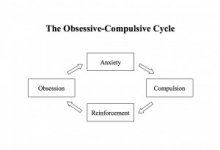David Baxter PhD
Late Founder
Scrupulosity - Wikipedia, the free encyclopedia
Scrupulosity is a psychological disorder characterized by pathological guilt about moral or religious issues. It is personally distressing, objectively dysfunctional, and often accompanied by significant impairment in social functioning.[1] It is typically conceptualized as a moral or religious form of obsessive–compulsive disorder (OCD),[2]
In scrupulosity, a person's obsessions focus on moral or religious fears, such as the fear of being an evil person or the fear of divine retribution for sin. Although it can affect nonreligious people, it is usually related to religious beliefs. In the strict sense, not all obsessive–compulsive behaviors related to religion are instances of scrupulosity: strictly speaking, for example, scrupulosity is not present in people who repeat religious requirements merely to be sure that they were done properly.[15]



 :lol:
:lol: